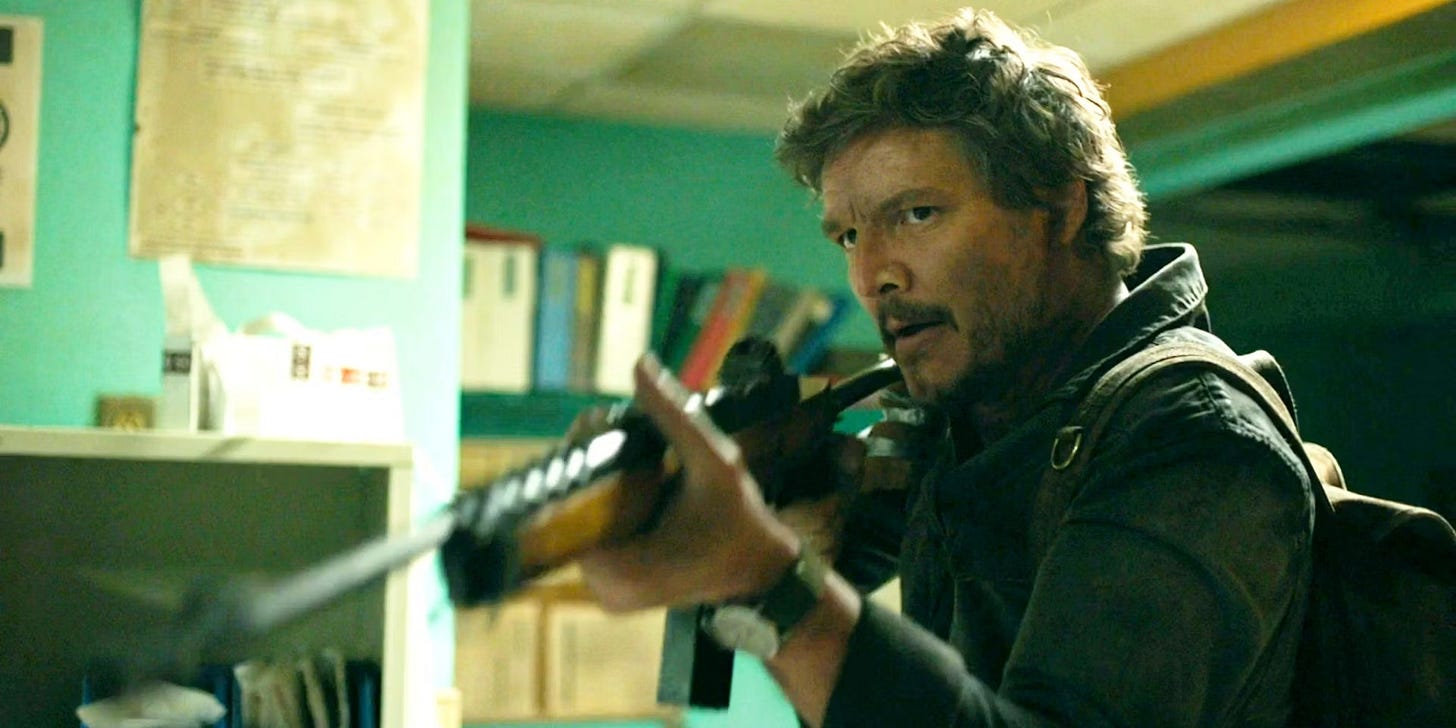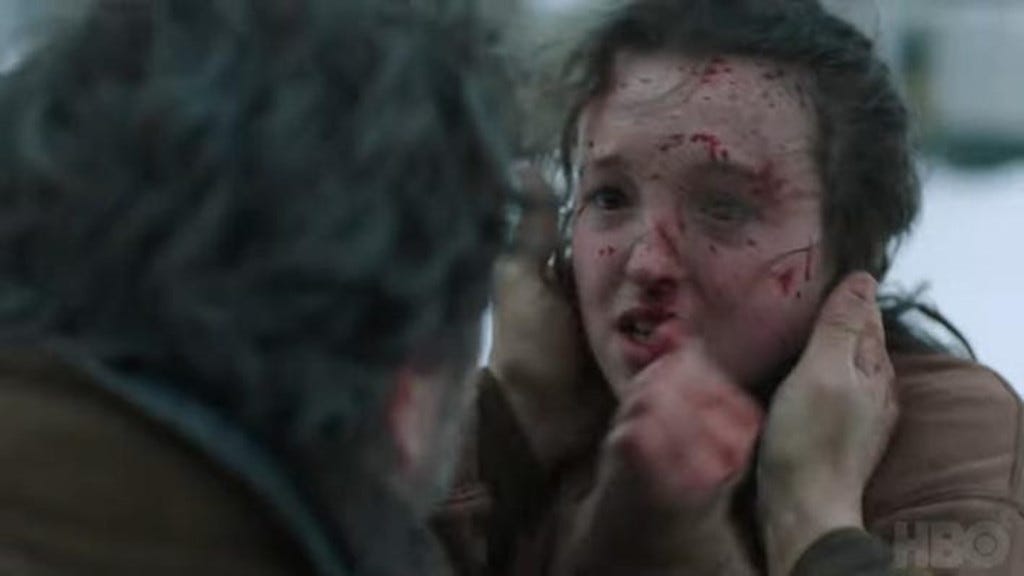‘The Last of Us’ Redux: Signposts
When Someone Tells You Who They Are, Believe Them
NEW STANDARD DISCLAIMER: This newsletter aggressively spoils things.
Being a writer isn’t always the most exciting profession. We’re not exploring dank caves or fighting off criminals or discovering cures for diseases or rescuing children from traffickers—most of us spend our time sitting in front of a keyboard making up stories1. So there is sometimes an urge to dress this up a bit, to make writing fiction seem like a Hemingwayesque challenge, some wrestling match between good and evil that we’re officiating, or some sweat-inducing attempt to find truth or some such horseshit2. In other words, we writers sometimes like to pretend this is tough work, because the alternative is to admit we’re just making shit up.
This sometimes plays out as a deep commitment to the idea that writing a good story involves lots of subtle work, that you have to master all manner of secret, occult tricks to be able to build a universe and tell a story involving compelling characters3. And yes, there’s truth to that—there is skill involved—but it’s also usually a lot simpler than it looks. A perfect example at how dumbly simple storytelling can be: The Last of Us, which I have written about before. But when it comes to repeating myself, I am usually Bilbo Baggins wondering after all, why not?4
The Season One finale of the The Last of Us left some people a bit upset because the male protagonist-cum-father figure, Joel (the delightful Pedro Pascal) went on a bit of a murderous rampage when he found out the Fireflies were planning to make a world-saving anti-fungal-zombie cure by scooping out the brains of the girl he’d been hired to deliver and subsequently come to regard as a surrogate daughter, Ellie (Bella Ramsey)5. People evinced disappointment that Joel would take such a heel turn, even if they understood the motivation for killing approximately a billion people in the space of about 15 minutes. Couldn’t Joel have killed slightly fewer people? Did he have to be such a dick about killing everyone6?
On the one hand I kind of understand this reaction: Joel is a protagonist and many people assume that means he’s a hero, plus he’s portrayed by charisma-machine Pascal7. But no one should have been surprised—and not only because this twist came straight from the video game. No one should have been surprised because the show spent 8 episodes telling us exactly who Joel was.
When People Show You Who They Are, Believe Them
Throughout the entire run of The Last of Us, Joel is variously described as a bad man, a dangerous man, a killer, and worse. The leader of the Fireflies—a group that is willing to scoop out an innocent girl’s brains in order to attain their goals8—regards him as a terrible risk she wants nothing to do with, and everyone who knew Joel from before the beginning of the show treats him like a time bomb. There are clear hints that Joel has done some truly terrible things.
At the same time, he’s clearly a man used to dealing violence, and solving his problems using that violence9. We’re shown several times during the course of the season how good Joel is at killing people, and several other characters explicitly note how good he is at killing people10. For example, when Joel and Ellie meet Sam and Henry, Henry asks for Joel’s help in escaping the city because he’s seen the man work, and he knows that having someone so good at shooting, knifing, and strangling people will be useful. And just one episode before the finale, we were treated to an extended sequence in which Joel cruelly and enthusiastically tortured and murdered some mopes in order to attempt Ellie’s rescue11.
In other words, if you got to episode 9 of The Last of Us without realizing that Joel is a killing machine, you simply weren’t paying attention.
The Hero Takes a Fall
This brings us back to that question of protagonist versus hero. Joel is the former, and not the latter, and that’s okay. And I think it’s fair to say that most fans of the show would have been okay with Joel going slightly John Wick to rescue Ellie—after all, there was no pushback or outcry after his rampage in episode 8. It wasn’t the fact that he killed a bunch of people, it was the scale of it—and his flat affect as he did so.
We expect our protagonists to at least regret it when they are forced by cruel fate to murder a few dozen people. Instead, Pascal portrays Joel’s rampage with the blank-faced, dead-eyed affect of a sociopath. It’s a powerful acting choice and a disconcerting experience to watch—people put up their hands and are zero threat to him, and he kills them anyway12. The doctor about to scoop Ellie’s brains poses zero threat, and Joel kills him without a single stitch of hesitation. It’s disturbing, and that’s why it affected people so much. This isn’t a good man doing bad things with an air of weary reluctance. This is a monster finally unleashed.
And, personally, I am there for it. We need more unvarnished monsters in the protagonist role. I’m just glad I’ll never have to deal with similar moral quandaries as I would absolutely be among the first five or six victims of the zombie apocalypse13. And my final facial expression will probably be more comical than murderous, frankly.
Next week: Mythic Quest and the sitcom loop.
Now that AI can write novels it’s time to finally follow my dreams and train to become an international assassin.
Most of us do this by drinking heroic amounts of alcohol and then writing novels where every metaphor is about battling crippling hangovers. This is science.
Don’t get me wrong: Black magic is involved. It’s just a lot easier than the Dungeon Master’s Guide made it seem.
Also, as I get older I am increasingly aware that I have exactly four ideas in my head and I just keep combining them in different ways to create new stories. And one of those ideas is always “I should nap more.”
Also because apparently a lot of people not only don’t play video games, they also pay fuckall attention to them, because this is one of the most widely-known “spoilers” of all time. Also, that was quite a sentence up there, wasn’t it? Me good writer.
The general rule of all fictional apocalypses is: Every one you don’t kill will eventually show up to kill you, so you might as well just kill everyone immediately.
I have a feeling that if I ever randomly met Pedro Pascal socially, within an hour I’d be dancing somewhere.
Let’s dust off “humans are the real monsters” and pretend it’s fresh and new, want to?
Much in the same way I am used to solving my problems with liquor and sick dance moves. Hey, it works — sure, the problem isn’t actually solved, but by the end of the evening I have acquired all new problems, which is something at least.
It is, in fact, the only skill that Joel appears to have.
Meanwhile, Ellie was engaged in a bit of a murder spree herself. I think it’s time to admit we’d all love an apocalypse simply for the free murderin’ pass it would represent.
It’s especially powerful because no one can watch Pedro Pascal in action and not imagine him as your boyfriend or best friend, leading you on adventures and cooking delicious meals. So when he grimly murders folks, that shit lands.
In the Last of Us universe, apparently anyone who likes baked goods went first, so I would be that zombie running around with a bag of cookies clutched in his gnarled hands.





I love your observation that it’s "time to admit we’d all love an apocalypse simply for the free murderin’ pass it would represent." It's true. It's part of the reason people horde guns. Unfortunately, some people are beginning to loose the demarcation between their fantasy and reality. Not tryin' to get into politics. Just sayin'...
No surprise that I haven't seen any of 'The Last of Us', but I have a passing acquaintance with Bilbo Baggins. So, handsies or nothing?